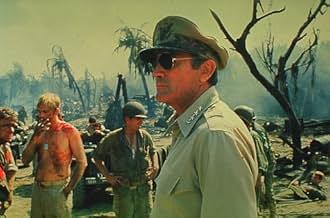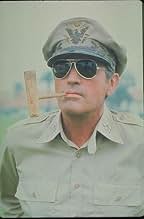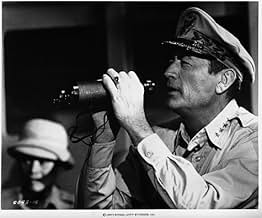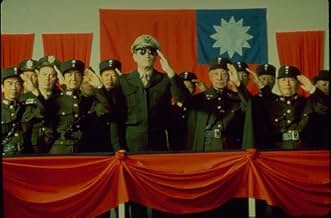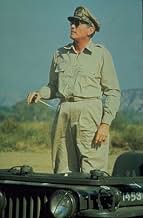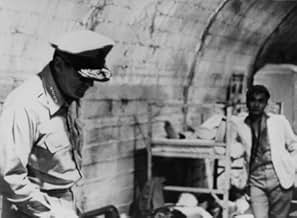IMDb RATING
6.5/10
5.5K
YOUR RATING
Biopic of General Douglas MacArthur covering his war exploits during WW2 and the Korean War.Biopic of General Douglas MacArthur covering his war exploits during WW2 and the Korean War.Biopic of General Douglas MacArthur covering his war exploits during WW2 and the Korean War.
- Awards
- 2 nominations total
Russell Johnson
- Admiral King
- (as Russell D. Johnson)
- Director
- Writers
- All cast & crew
- Production, box office & more at IMDbPro
Featured reviews
Like the Movies made about Jesus Christ, no one is going to Agree about its complete Accuracy or Decisions concerning the Time Period covered. It's virtually an Impossible Task to present a Total Conception and with Budget and Running Time Restrictions adding to the Limitations.
Most WWII Historians, Armchair or otherwise, tend to give Gregory Peck a nod and are Thankful that His Liberal Leanings did not Cloud His Judgement or Portrayal of the Dynamic and Controversial General.
It is Well Known that MacArthur was Hell Bent on Crafting an Image of Himself as Larger than Life. The Movie has a few Scenes where His Aides Instruct the Newsreel Cameraman to Film the General from a Low Angle, "He loves that technique.". He used Props (corncob pipe) to give Himself a Unique Flair and His Filmed Entrances are Legendary.
MacArthur was not only a Brilliant General, He was a Brilliant Man. His Eloquent way with Words, making His Arguments and displayed Insights with a Poetic Zeal. All of the Aforementioned is seen in this Even Handed Account, originally Made-for TV than Edited for a Theatrical Release.
The Film is Sweeping in Concept, if not in Presentation. It's somewhat Low-Budget renders a Flat Production, but it makes up for it with Peck's Command of the Role and an Appropriately Wordy Script.
Above Average and a Powerful Portrayal of just over a Decade in the Complicated and ever Interesting Leader who was much Loved by the American People, the Philippines, and Japan (for His compassionate and intelligent restructuring of the island's ashes).
President Truman did not Worship the General, as many did and the Movie ends with MacArthur Relieved by the Commander and Chief. It seems even the Accomplished Military Leader was Unable to "Walk On Water", and was Symbolically Crucified by the President.
Most WWII Historians, Armchair or otherwise, tend to give Gregory Peck a nod and are Thankful that His Liberal Leanings did not Cloud His Judgement or Portrayal of the Dynamic and Controversial General.
It is Well Known that MacArthur was Hell Bent on Crafting an Image of Himself as Larger than Life. The Movie has a few Scenes where His Aides Instruct the Newsreel Cameraman to Film the General from a Low Angle, "He loves that technique.". He used Props (corncob pipe) to give Himself a Unique Flair and His Filmed Entrances are Legendary.
MacArthur was not only a Brilliant General, He was a Brilliant Man. His Eloquent way with Words, making His Arguments and displayed Insights with a Poetic Zeal. All of the Aforementioned is seen in this Even Handed Account, originally Made-for TV than Edited for a Theatrical Release.
The Film is Sweeping in Concept, if not in Presentation. It's somewhat Low-Budget renders a Flat Production, but it makes up for it with Peck's Command of the Role and an Appropriately Wordy Script.
Above Average and a Powerful Portrayal of just over a Decade in the Complicated and ever Interesting Leader who was much Loved by the American People, the Philippines, and Japan (for His compassionate and intelligent restructuring of the island's ashes).
President Truman did not Worship the General, as many did and the Movie ends with MacArthur Relieved by the Commander and Chief. It seems even the Accomplished Military Leader was Unable to "Walk On Water", and was Symbolically Crucified by the President.
History buffs will find plenty to quibble with in "MacArthur." Like a lot of World War II movies, it has its share of minor errors. And American military enthusiasts are certain to have strong opinions on Douglas MacArthur already, which will affect their views of the film.
But all in all, I think this is a remarkably balanced look at an extremely controversial person. For those who know little about MacArthur, it's a good place to start. He was a larger-than-life figure, and in this film you can see both why he was revered and why he was despised.
Although MacArthur came of age in the 19th century and became a general in World War I, this movie focuses on his high and lows in World War II and the Korean War. During that time he was an iconic figure. "Iconic" is an overused word, but it applies to him. With his trademark hat and corncob pipe, plus his curiously old-fashioned way of speaking and his instinct for controversy, he was unmistakable and larger than life.
During the late 1970s, the post-Watergate era, traditional war pictures were no longer in vogue. "M*A*S*H," the mildly pacifist TV series set in the Korean War, treated MacArthur as a rather silly figure. But this movie, made in 1977, takes the man seriously, while showing his flaws clearly. It also is more frank than most classic films about how little consensus there is in warmaking. Leaders quarrel and connive while making policy, and the most loyal grunts are often dismayed at the decisions that put them in harm's way.
Gregory Peck is excellent in capturing the complexity of Douglas MacArthur. Peck was an outspoken political liberal, and one has to assume he was no admirer of the unabashedly right-wing MacArthur. But he takes on the man's persona admirably.
After heaping so much praise on "MacArthur," I must admit it is not great cinema. It's more interesting than moving. But if you're under 50 and know Douglas MacArthur only as a name in the history books, this will be an eye-opener. Like any good introduction to a subject, it should encourage you to seek other information and form your own opinions about the man and his times.
But all in all, I think this is a remarkably balanced look at an extremely controversial person. For those who know little about MacArthur, it's a good place to start. He was a larger-than-life figure, and in this film you can see both why he was revered and why he was despised.
Although MacArthur came of age in the 19th century and became a general in World War I, this movie focuses on his high and lows in World War II and the Korean War. During that time he was an iconic figure. "Iconic" is an overused word, but it applies to him. With his trademark hat and corncob pipe, plus his curiously old-fashioned way of speaking and his instinct for controversy, he was unmistakable and larger than life.
During the late 1970s, the post-Watergate era, traditional war pictures were no longer in vogue. "M*A*S*H," the mildly pacifist TV series set in the Korean War, treated MacArthur as a rather silly figure. But this movie, made in 1977, takes the man seriously, while showing his flaws clearly. It also is more frank than most classic films about how little consensus there is in warmaking. Leaders quarrel and connive while making policy, and the most loyal grunts are often dismayed at the decisions that put them in harm's way.
Gregory Peck is excellent in capturing the complexity of Douglas MacArthur. Peck was an outspoken political liberal, and one has to assume he was no admirer of the unabashedly right-wing MacArthur. But he takes on the man's persona admirably.
After heaping so much praise on "MacArthur," I must admit it is not great cinema. It's more interesting than moving. But if you're under 50 and know Douglas MacArthur only as a name in the history books, this will be an eye-opener. Like any good introduction to a subject, it should encourage you to seek other information and form your own opinions about the man and his times.
There isn't much argument that MacArthur was a good strategist and a brave man. And that's the picture you get of him in this movie. Besides a bit of vanity, only the slightest, the general seems to have no flaws. The dark side of this genius is missing.
Of course no movie, not even at 130 minutes, can capture all of a man's professional history, but the lacunae here are convenient ones. The upshot is that this is like one of those John Singer Sargent portraits of society women that made them look sexier and prettier than they probably were.
For instance, MacArthur remarks somewhere along the line that his casualties are fewer than anyone else's (or something like that) when in fact those figures have been contested. MacArthur's aching desire to invade China is turned into a kind of a joke, when he complains that he is only allowed to bomb the southern entrances to bridges across the Yalu River -- "In all my career, I've never learned how to bomb HALF A BRIDGE." Very amusing. But then his political views as a whole, which were somewhere to the right of Attila the Hun's, are skipped over. His run for president fizzled because not even the most rabid anti-communist power broker wanted a war with China, but this too is turned into a morbid joke, when MacArthur remarks to his wife about the newly elected Eisenhower -- "He'll make a great president. He was the best clerk I ever had." (Eisenhower's joke appears elsewhere -- "I spent seven years under MacArthur studying dramatics.") The most illustrative revelation of MacArthur's character isn't in the film. MacArthur recruited Weldon E. Rhoades as the personal pilot of his B-17 and the aviator became a loyal disciple and sometimes personal confidant. By Rhoades' own admission, "this meant that the general would talk for great lengths of time during which Rhoades was not expected to respond."
One last point that is glossed over. MacArthur is stuck on the island of Corregidor in the Philippines surrounded by Japanese but prepared to fight it out. He is ordered to return to Australia on PT boats. He objects strenuously but in the end obeys his orders and retreats. It's a dangerous voyage on small worn-out boats made of plywood. And for this he is awarded the medal of honor. The officers and men of that handful of boats made the same voyage -- round trip too -- and no medals of honor for them, although they were acting under the same conditions, following orders. (An aside: the bar is a little lower for high-ranking officers, which is why their dress uniforms seem to droop with decorations like some Latin American dictators'.)
But it's not a bad movie, as long as you're looking for a heroic picture of an undoubtedly heroic man. Gregory Peck exudes his usual sincerity and is a much more effective speaker than MacArthur himself who almost always sounded like a blowhard. And Peck had to do quite a good job to overcome that florid prose -- "Still, I listen with thirsty ear for the tocsin call," etc. ("Thirsty ear.") In a speech at West Point McArthur also misattribues a quote from Santayana to Plato ("only the dead have seen the end of war"), but that's carping.
The movie follows the same pattern as "Patton." Give us an admirable hero, one human enough to have a little fun poked at him. (Peck emerges from a shower draped in a couple of huge bath towels arranged like a toga, so that he resembles Caesar.) Surround him with devoted but sometimes puzzled subordinates who, when they are not courting his favor, are warning him that something he plans to do might be misinterpreted by the suits back in Washington. Just don't have him do anything seriously wrong.
Production values are good. This is an expensive picture. Supporting players more or less blend into one another -- there's only room for one Caesar in this movie.
Some things are left unexplained, unintentionally it would seem, since this is not the kind of movie that thrives on leaving anything up to the viewer. General Wainwright is left behind on Corregidor to surrender to the Japanese. Back in Australia, MacArthur fumes at such cowardice, Wainwright must be temporarily deranged. But when they meet again when Manila is liberated, MacArthur greets him like a long lost pal. What happened? And the big meeting between MacArthur and Truman that was supposed to iron out the differences between them? It's confusingly staged and scripted. Both sides seem to come away satisfied but, if that were the case, the satisfaction must have been based on some profound misunderstandings because afterward MacArthur and Truman both went merrily on their divergent ways.
I kind of enjoy watching it once in a while. The Irish Daniel O'Herlihy does a side-splitting impression of Franklin D. Roosevelt. And the action scenes are fairly well done. I do wish that the movie had been more honest with its subject. As it is, it's a flawed movie about a flawed but remarkable man.
Of course no movie, not even at 130 minutes, can capture all of a man's professional history, but the lacunae here are convenient ones. The upshot is that this is like one of those John Singer Sargent portraits of society women that made them look sexier and prettier than they probably were.
For instance, MacArthur remarks somewhere along the line that his casualties are fewer than anyone else's (or something like that) when in fact those figures have been contested. MacArthur's aching desire to invade China is turned into a kind of a joke, when he complains that he is only allowed to bomb the southern entrances to bridges across the Yalu River -- "In all my career, I've never learned how to bomb HALF A BRIDGE." Very amusing. But then his political views as a whole, which were somewhere to the right of Attila the Hun's, are skipped over. His run for president fizzled because not even the most rabid anti-communist power broker wanted a war with China, but this too is turned into a morbid joke, when MacArthur remarks to his wife about the newly elected Eisenhower -- "He'll make a great president. He was the best clerk I ever had." (Eisenhower's joke appears elsewhere -- "I spent seven years under MacArthur studying dramatics.") The most illustrative revelation of MacArthur's character isn't in the film. MacArthur recruited Weldon E. Rhoades as the personal pilot of his B-17 and the aviator became a loyal disciple and sometimes personal confidant. By Rhoades' own admission, "this meant that the general would talk for great lengths of time during which Rhoades was not expected to respond."
One last point that is glossed over. MacArthur is stuck on the island of Corregidor in the Philippines surrounded by Japanese but prepared to fight it out. He is ordered to return to Australia on PT boats. He objects strenuously but in the end obeys his orders and retreats. It's a dangerous voyage on small worn-out boats made of plywood. And for this he is awarded the medal of honor. The officers and men of that handful of boats made the same voyage -- round trip too -- and no medals of honor for them, although they were acting under the same conditions, following orders. (An aside: the bar is a little lower for high-ranking officers, which is why their dress uniforms seem to droop with decorations like some Latin American dictators'.)
But it's not a bad movie, as long as you're looking for a heroic picture of an undoubtedly heroic man. Gregory Peck exudes his usual sincerity and is a much more effective speaker than MacArthur himself who almost always sounded like a blowhard. And Peck had to do quite a good job to overcome that florid prose -- "Still, I listen with thirsty ear for the tocsin call," etc. ("Thirsty ear.") In a speech at West Point McArthur also misattribues a quote from Santayana to Plato ("only the dead have seen the end of war"), but that's carping.
The movie follows the same pattern as "Patton." Give us an admirable hero, one human enough to have a little fun poked at him. (Peck emerges from a shower draped in a couple of huge bath towels arranged like a toga, so that he resembles Caesar.) Surround him with devoted but sometimes puzzled subordinates who, when they are not courting his favor, are warning him that something he plans to do might be misinterpreted by the suits back in Washington. Just don't have him do anything seriously wrong.
Production values are good. This is an expensive picture. Supporting players more or less blend into one another -- there's only room for one Caesar in this movie.
Some things are left unexplained, unintentionally it would seem, since this is not the kind of movie that thrives on leaving anything up to the viewer. General Wainwright is left behind on Corregidor to surrender to the Japanese. Back in Australia, MacArthur fumes at such cowardice, Wainwright must be temporarily deranged. But when they meet again when Manila is liberated, MacArthur greets him like a long lost pal. What happened? And the big meeting between MacArthur and Truman that was supposed to iron out the differences between them? It's confusingly staged and scripted. Both sides seem to come away satisfied but, if that were the case, the satisfaction must have been based on some profound misunderstandings because afterward MacArthur and Truman both went merrily on their divergent ways.
I kind of enjoy watching it once in a while. The Irish Daniel O'Herlihy does a side-splitting impression of Franklin D. Roosevelt. And the action scenes are fairly well done. I do wish that the movie had been more honest with its subject. As it is, it's a flawed movie about a flawed but remarkable man.
It is inevitable that MACARTHUR will be compared to PATTON, the other military biopic produced by the late Frank McCarthy. Such comparisons are unfortunate because their subjects are vastly different, albeit controversial figures, and each film takes a different approach in examining their impact on history.
George S. Patton commanded an Army formation in Europe while Douglas Macarthur commanded an entire theater of operation in the Pacific. By his own admission, Patton never had any political ambitions, while MacArthur definitely had such aspirations. Patton's political naivety made him ill-suited as the postwar occupation commander in Bavaria while MacArthur's political astuteness served him well during the occupation of Japan.
Yet both men were great, if iconoclastic military leaders. Patton's brilliant northern pivot during the Battle of the Bulge is matched by the MacArthur's daring amphibious landing at Inchon. And both men believed strongly in their destiny; Patton's belief was based on reincarnation while MacArthur was motivated by following in his illustrious father's footsteps.
Surprisingly, PATTON is the much more succinct, less ambitious film than MACARTHUR. It concentrates on its colorful, mercurial main character during a comparatively brief two-year period between the American defeat at Kasserine Pass in early 1943 to Patton's dismissal prior to his death in late 1945. Although we see Patton's conflict with Omar Bradley, Bernard Montgomery, and Bedell Smith, we never see his interaction with General Dwight Eisenhower, Prime Minister Winston Churchill, or General George Marshall, the U.S. Army's chief of staff.
MACARTHUR is a much more ambitious film, covering nearly a decade from the fall of Bataan in early 1942 to MacArthur's dismissal in 1951. Additionally, MACARTHUR shows a wider range of conflict between MacArthur and such individuals as Admiral Nimitz, General Marshall, ambassador William Averell Harriman, and Presidents Roosevelt and Harry S. Truman.
So, does MACARTHUR match PATTON as a groundbreaking biopic? No, it doesn't.
MACARTHUR lacks the insightful, acerbic screenplay that Francis Ford Coppola and Edmund North supplied PATTON. The direction by TV veteran Joseph Sargent is yeoman-like where the late Franklin J. Schaffner offers a more vigorous, hell-for-leather approach to PATTON. Both films are handsomely mounted productions that serve as a tribute to acumen of the producer McCarthy. Both movies benefit from film scores by the ever-reliable Jerry Goldsmith.
While PATTON has its main character departing in a Valhalla-like denouement, MACARTHUR is book-ended by the legendary speech that the old soldier delivered to the cadet corps at West Point in 1962 as a final valedictory.
At the heart of both films are the extraordinary performances of their lead actors. The late George C. Scott's portrayal of Patton is justly remembered, but Gregory Peck delivers a performance that is both subtle and unapologetic and helps to elevate this often-pedestrian production to a higher level. Peck's portrayal is reminiscent of his work in TWELVE O'CLOCK HIGH, but with the added weight of an additional thirty years of experience and craftsmanship that this great actor brings to bear to this role. Peck is ably supported by Dan O'Herlihy as FDR and the late Ed Flanders as Harry S. Truman.
Finally, I must note the presence of Dr. D. Clayton James, the author of the standard multi-volume biography of MacArthur, who served as this film's technical advisor.
George S. Patton commanded an Army formation in Europe while Douglas Macarthur commanded an entire theater of operation in the Pacific. By his own admission, Patton never had any political ambitions, while MacArthur definitely had such aspirations. Patton's political naivety made him ill-suited as the postwar occupation commander in Bavaria while MacArthur's political astuteness served him well during the occupation of Japan.
Yet both men were great, if iconoclastic military leaders. Patton's brilliant northern pivot during the Battle of the Bulge is matched by the MacArthur's daring amphibious landing at Inchon. And both men believed strongly in their destiny; Patton's belief was based on reincarnation while MacArthur was motivated by following in his illustrious father's footsteps.
Surprisingly, PATTON is the much more succinct, less ambitious film than MACARTHUR. It concentrates on its colorful, mercurial main character during a comparatively brief two-year period between the American defeat at Kasserine Pass in early 1943 to Patton's dismissal prior to his death in late 1945. Although we see Patton's conflict with Omar Bradley, Bernard Montgomery, and Bedell Smith, we never see his interaction with General Dwight Eisenhower, Prime Minister Winston Churchill, or General George Marshall, the U.S. Army's chief of staff.
MACARTHUR is a much more ambitious film, covering nearly a decade from the fall of Bataan in early 1942 to MacArthur's dismissal in 1951. Additionally, MACARTHUR shows a wider range of conflict between MacArthur and such individuals as Admiral Nimitz, General Marshall, ambassador William Averell Harriman, and Presidents Roosevelt and Harry S. Truman.
So, does MACARTHUR match PATTON as a groundbreaking biopic? No, it doesn't.
MACARTHUR lacks the insightful, acerbic screenplay that Francis Ford Coppola and Edmund North supplied PATTON. The direction by TV veteran Joseph Sargent is yeoman-like where the late Franklin J. Schaffner offers a more vigorous, hell-for-leather approach to PATTON. Both films are handsomely mounted productions that serve as a tribute to acumen of the producer McCarthy. Both movies benefit from film scores by the ever-reliable Jerry Goldsmith.
While PATTON has its main character departing in a Valhalla-like denouement, MACARTHUR is book-ended by the legendary speech that the old soldier delivered to the cadet corps at West Point in 1962 as a final valedictory.
At the heart of both films are the extraordinary performances of their lead actors. The late George C. Scott's portrayal of Patton is justly remembered, but Gregory Peck delivers a performance that is both subtle and unapologetic and helps to elevate this often-pedestrian production to a higher level. Peck's portrayal is reminiscent of his work in TWELVE O'CLOCK HIGH, but with the added weight of an additional thirty years of experience and craftsmanship that this great actor brings to bear to this role. Peck is ably supported by Dan O'Herlihy as FDR and the late Ed Flanders as Harry S. Truman.
Finally, I must note the presence of Dr. D. Clayton James, the author of the standard multi-volume biography of MacArthur, who served as this film's technical advisor.
Unlike Patton, Pershing, Grant or Eisenhower, MacArthur is a many sided character and Peck played the part as I believe MacArthur really was. The positive PR version produced by the U.S. Army in the l940's or the negative liberal press version of the l950's are very limited in their understanding of this great man. I have always believed that MacArthur was a turn of the century progressive much like Teddy Roosevelt, at the same time both imperial and caring, who lived past his time into the l960's. His tactical decisions were unmatched by any general in our history. His speeches rival those of William Jennings Bryan or Patrick Henry and I'm sure many wish we could send him and his administrative skills to Iraq to put that mess back together. In the years since his death a small cult has grown up around his memory much like Robert E.Lee and to some his words are almost mystical. He was a major player in one way or another in WWI, the depression, WWII, Korea and if you count his death-bed plea to President Johnson to get our troops out of Vietnam, even the Vietnam War. If you want to stretch things even farther, he can be tied to turn of the century imperialism and the Spanish-American War through his part in the Philippine Insurrection following the Spanish-American War and if you must, the Indian Wars which he experienced as a small boy with his parents. He has been described as a conservative, a liberal, a militant and a pacifist. How could one man be so much a part of the 19th century and believe in war only between individuals(like Custer and Crazy Horse) or as in feudal times yet advocate A-bombing China? He is always described as arrogant and overly dramatic but like Grant he wore a simple 2nd Lieutenant's uniform with five stars on the shoulder minus all the medals that the "G.I. generals" wore. I believe his love for the people of Asia was sincere and in this was he was like Alexander or Caesar. We are fortunate Gregory Peck did play MacArthur as such a complex individual. To focus only on the Five-Star General with the corn-cob pipe is to miss the the big picture. No wonder Patton is so easy to watch compared to MacArthur. I have seen the movie at least 15 times and am still moved by it.
Did you know
- TriviaAlthough Gregory Peck had reservations about the film's script and production quality, he later called it one of his favorite roles, if not one of his favorite movies.
- GoofsShortly after MacArthur's escape from the Philippines in the spring of 1942, he complains that the President and the Chiefs of Staff are not sending him enough troops, supplies, and equipment to carry on his war against the Japanese. He says that priorities are instead being given to commanders in other theaters, including Gen Patton in North Africa. However, Patton's troops did not arrive in Africa until November 1942.
- Quotes
President Sergio Osmena: You see, General, my people are going to laugh if I fell in deep water. I cannot swim!
General Douglas MacArthur: That's not so bad, Mr. President. Everyone's about to see that I can't walk on water.
- Alternate versionsThe UK DVD issue omits the sequence where MacArthur meets Emperor Hirohito, but instead, adds to the ending. The film now ends with MacArthur and his wife watch a TV transmission of the presidential inauguration of Eisenhower MacArthur's comment: "He will turn out fine. He was the best clerk that ever served under me"), followed by the end of MacArthur's farewell speech at West Point. The subsequent credits starts to roll slightly earlier than previously.
- How long is MacArthur?Powered by Alexa
Details
- Release date
- Country of origin
- Language
- Also known as
- MacArthur - Held des Pazifik
- Filming locations
- Navy Yard, Bremerton, Washington, USA(scenes on USS Missouri)
- Production company
- See more company credits at IMDbPro
Box office
- Budget
- $9,000,000 (estimated)
- Runtime
- 2h 10m(130 min)
- Sound mix
- Aspect ratio
- 1.85 : 1
Contribute to this page
Suggest an edit or add missing content

